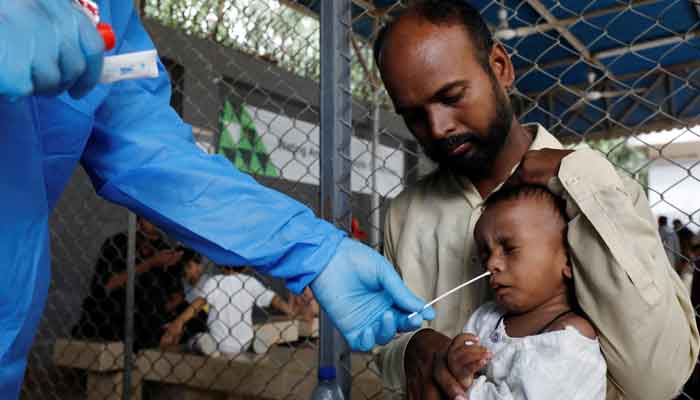COVID-19: Health expert believes Karachi fast approaching herd immunity
Dr Tahir Shamsi claims that over 45% of Karachi’s population has silently or asymptomatically contracted the infection
September 21, 2020

KARACHI: A top health expert in the city leading convalescent plasma therapy trials in the country believes that Pakistan, or Karachi at least, is knocking on the door of herd immunity.
The expert claims that millions have already contracted COVID-19 asymptomatically and are now immune to the infectious disease, The News reported Monday.
“COVID-19 antibodies were absent from the blood of 17% of Karachiites who had contracted the severe acute respiratory syndrome coronavirus 2 (SARS-CoV-2) and tested positive for the viral infectious disease through the PCR (polymerase chain reaction) test,” said haematologist and bone marrow transplant surgeon Prof Dr Tahir Sultan Shamsi.
He said that 68 of the 400 plasma donors who were infected with COVID-19 were tested through different methods but SARS-CoV-2 antibodies weren’t found in their blood.
“Our research shows that 17% of those who tested positive through the PCR test of various reputed labs didn’t develop COVID-19 antibodies. They were tested through the latest methods, and after comprehensive testing, it was concluded that despite getting infected with SARS-CoV-2, they couldn’t develop antibodies.”
He said this phenomenon is also being observed in other countries, as 8% of South Korea’s positive patients have not developed antibodies and 4% of China’s, but the absence of antibodies in 17% of Pakistan’s patients is quite a surprising discovery.
“But this doesn’t mean that these people aren’t immune against COVID-19 after getting infected with the coronavirus, as their bodies can provide immunity against it through memory T cells.”
Dr Shamsi, according to The News, maintained that it is unclear how long those who do have antibodies will remain immune to the antigen or the virus, saying that the presence of antibodies does not guarantee lifetime immunity.
‘Over 45% have contracted virus’
Citing the seroprevalence studies conducted at the National Institute of Blood Diseases in Karachi as well as by other health organisations, the health expert also claimed that over 45%, or even up to 50%, of Karachi’s population has silently, or asymptomatically, contracted the infection.
He also claimed that within a few weeks Karachi might be able to achieve herd immunity, where transmission of the virus in the community would almost come to a halt.
He said that the dramatic decline in positive cases, reduced hospitalisation, the decreasing number of deaths and the antibody tests done on around 2,300 people from three different segments of society in Karachi since April indicate that 45 to 50% of the city’s population has developed antibodies.
“Our research shows that 45 to 50% of Karachiites have been infected asymptomatically, and within the next few weeks 65-70% of the city’s population would have been infected, which is the minimum requirement for achieving herd immunity in the case of COVID-19.”
‘Immunity is also complicated’
Dr Faisal Mehmood of the Aga Khan University Hospital, who also sits on Sindh government’s coronavirus advisory body, said that the absence of COVID-19 antibodies in the blood of positive patients is not a big deal, saying that the lack of antibodies does not mean a person has not cleared the infection.
“There are many arms and parts of the immune system. Antibodies are only one of them. So, the lack of antibodies doesn’t mean you haven’t cleared the infection. Immunity to SARS-CoV-2 is also complicated,” he said.
“You make many different types of antibodies, and not all of these are neutralising or able to block the virus. The kits used in the clinical lab are unable to differentiate between them and, hence, can’t be used to assess if a person is immune.”
And even if the antibodies are neutralising, he added, “we don’t know how long they last and what level needs to be maintained. Also, the place where the antibodies are — blood versus the nasal cavities — may be important”.
Dr Mehmood stressed that it is not as simple as only checking the antibodies in the blood to determine whether or not a person is immune.











